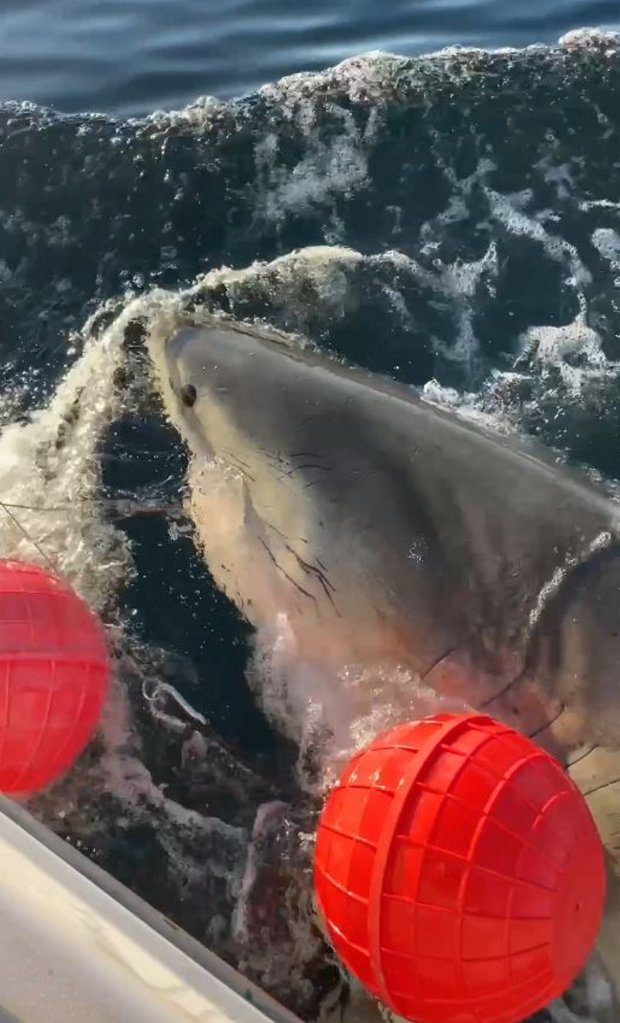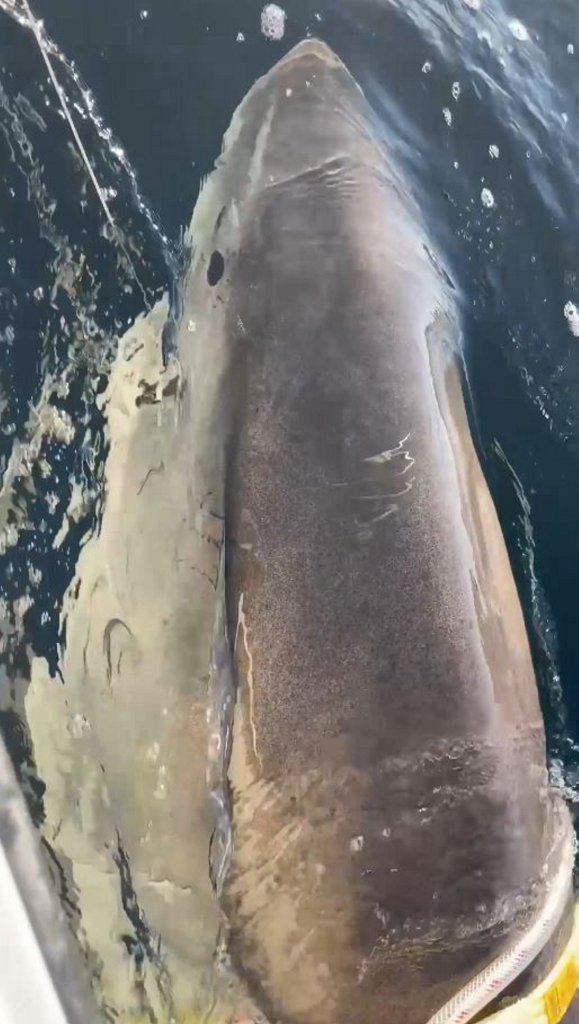One of the scientists involved in tracking Contender – the biggest great white shark ever recorded by researchers in the Atlantic – has revealed how to escape a close encounter.
Contender, the 14-foot beast, was tagged in the North Atlantic by OCEARCH in January – a non-profit organization that conducts research on large marine animals – 45 miles off the Florida-Georgia coast, off Jacksonville and popped up off Pamlico Sound in North Carolina earlier this month.
There have been a number of other reports of shark incidents in recent days – including a nine-year-old girl nearly had her hand bitten off near Boca Grande, Florida.

Dr. Harley Newton, chief scientist and veterinarian for OCEARCH, from Jacksonville, Florida, has dedicated her career to studying sharks – including Contender – and educating the public.
She has revealed the surprising thing you should avoid wearing when swimming in the ocean – and what do to if you do come face to face with a predator.
Her advice includes avoiding dawn and dusk swims, staying close to shore, swimming with a buddy, and avoid wearing shiny objects like jewellery.
And she said maintain visual contact if you spot a shark, backing away slowly while facing it.
While shark attacks are rare, she stresses awareness and respect for the ocean.
“The ocean is a wild place,” Dr. Newton said.
“If you see schools of fish, particularly if they’re jumping out of the water, that might be something that you want to move away from because that’s going to be very attractive for sharks, and it might help you avoid an accident or an incident.”

While shark attacks are extremely rare, Dr. Newton advises that maintaining visual contact with an aggressive shark is crucial for safety.
As a last resort, striking the shark’s nose may deter it; however, this should only be attempted if necessary.
According to Dr. Newton, bull sharks and tiger sharks are considered among the most dangerous species due to their size, strength, and habitat preferences that bring them into contact with humans.
She notes that all sharks should be treated with caution and respect.
Dr. Newton is passionate about correcting myths about sharks.
Contrary to popular belief, sharks can get cancer, can not smell blood from miles away – the max distance the length of an Olympic-size swimming pool – and are not mindless man-eaters seeking human prey.
“They are most often looking for prey or typical prey items when there are interactions with humans,” Dr. Newton said.
“They’re not out there actively looking for humans. They’re looking for the typical prey that they would want to eat.”
OCEARCH’s tracking of Contender has also provided valuable data about great white shark migration patterns.
Its movements from Florida northward along the Atlantic coast have provided researchers with unprecedented insights into the behavior of adult male sharks.
“Catching an adult male shark in January was a new data point for us,” Dr. Newton noted. “We were really excited to catch him, tag him, sample him, and release him.”

This tracking effort helps scientists understand shark habitat use and identify areas where human and shark activities overlap, potentially reducing the risk of negative interactions between them.
The ongoing monitoring of Contender and other sharks contributes to both conservation efforts and public safety by providing real-time data about shark movements and behavior patterns.
This knowledge allows for more informed beach management decisions and helps educate the public about sharing the ocean with these apex predators.
As summer approaches and more people head to beaches along the Atlantic coast, Dr. Newton emphasizes that awareness and respect for the ocean environment are key to staying safe.
“Understanding that we’re entering their habitat is important,” Dr. Newton said.
She added: “Sharks play a vital role in maintaining healthy ocean ecosystems, and with some simple precautions, we can safely enjoy the water while respecting these magnificent animals that have been evolving for over 400 million years.”

TIPS
Avoid swimming at dawn or dusk when sharks are most active and hunting
Stay close to shore where you can quickly exit the water if needed
Always swim with a buddy rather than venturing into the ocean alone
Remove shiny jewelry or accessories that might resemble fish scales and attract sharks
Be aware of your surroundings, especially schools of fish jumping out of water, which could indicate predator presence
Move away from areas with fishing activity, as bait and injured fish can attract sharks
Maintain visual contact if you spot a shark, backing away slowly while facing it
The post Scientist tracking ‘biggest ever’ great white shark Contender reveals how to escape close encounter appeared first on New York Post.



